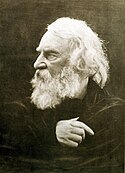Henry Wadsworth Longfellow Quote
Lull me to sleep, ye winds, whose fitful soundSeems from some faint Aeolian harp-string caught;Seal up the hundred wakeful eyes of thoughtAs Hermes with his lyre in sleep profoundThe hundred wakeful eyes of Argus bound;For I am weary, and am overwroughtWith too much toil, with too much care distraught,And with the iron crown of anguish crowned.Lay thy soft hand upon my brow and cheek,O peaceful Sleep! until from pain releasedI breathe again uninterrupted breath!Ah, with what subtile meaning did the GreekCall thee the lesser mystery at the feastWhereof the greater mystery is death!
Henry Wadsworth Longfellow
Lull me to sleep, ye winds, whose fitful soundSeems from some faint Aeolian harp-string caught;Seal up the hundred wakeful eyes of thoughtAs Hermes with his lyre in sleep profoundThe hundred wakeful eyes of Argus bound;For I am weary, and am overwroughtWith too much toil, with too much care distraught,And with the iron crown of anguish crowned.Lay thy soft hand upon my brow and cheek,O peaceful Sleep! until from pain releasedI breathe again uninterrupted breath!Ah, with what subtile meaning did the GreekCall thee the lesser mystery at the feastWhereof the greater mystery is death!
Related Quotes
About Henry Wadsworth Longfellow
Henry Wadsworth Longfellow (February 27, 1807 – March 24, 1882) was an American poet and educator. His original works include the poems "Paul Revere's Ride", "The Song of Hiawatha", and "Evangeline". He was the first American to completely translate Dante Alighieri's Divine Comedy and was one of the fireside poets from New England.
Longfellow was born in Portland, District of Maine, Massachusetts (now Portland, Maine). He graduated from Bowdoin College and became a professor there and, later, at Harvard College after studying in Europe. His first major poetry collections were Voices of the Night (1839) and Ballads and Other Poems (1841). He retired from teaching in 1854 to focus on his writing, and he lived the remainder of his life in the Revolutionary War headquarters of George Washington in Cambridge, Massachusetts.
His first wife, Mary Potter, died in 1835 after a miscarriage. His second wife, Frances Appleton, died in 1861 after sustaining burns when her dress caught fire. After her death, Longfellow had difficulty writing poetry for a time and focused on translating works from foreign languages. Longfellow died in 1882.
Longfellow wrote many lyric poems known for their musicality and often presenting stories of mythology and legend. He became the most popular American poet of his day and had success overseas. He has been criticized for imitating European styles and writing poetry that was too sentimental.
Longfellow was born in Portland, District of Maine, Massachusetts (now Portland, Maine). He graduated from Bowdoin College and became a professor there and, later, at Harvard College after studying in Europe. His first major poetry collections were Voices of the Night (1839) and Ballads and Other Poems (1841). He retired from teaching in 1854 to focus on his writing, and he lived the remainder of his life in the Revolutionary War headquarters of George Washington in Cambridge, Massachusetts.
His first wife, Mary Potter, died in 1835 after a miscarriage. His second wife, Frances Appleton, died in 1861 after sustaining burns when her dress caught fire. After her death, Longfellow had difficulty writing poetry for a time and focused on translating works from foreign languages. Longfellow died in 1882.
Longfellow wrote many lyric poems known for their musicality and often presenting stories of mythology and legend. He became the most popular American poet of his day and had success overseas. He has been criticized for imitating European styles and writing poetry that was too sentimental.
